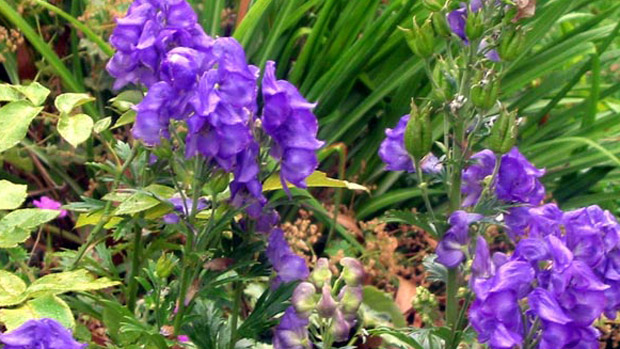Wolfsbane 'killed gardener' on millionaire's estate
Gardener's contact with the highly poisonous Wolfsbane likely caused organ failure, a pre-inquest hearing reveals

A free daily email with the biggest news stories of the day – and the best features from TheWeek.com
You are now subscribed
Your newsletter sign-up was successful
A gardener who died while tending to a multi-million pound estate was likely poisoned by a deadly flower, a coroner has heard.
Nathan Greenaway, 33, was employed by the owners of Millcourt House in Hampshire and collapsed while at work in September.
He was rushed to hospital, but doctors were unable to determine the cause of his illness and he died of multiple organ failure almost a week later. The potential cause of death only became apparent after Greenaway’s father began his own investigation and discovered the link to the deadly plant.
The Week
Escape your echo chamber. Get the facts behind the news, plus analysis from multiple perspectives.

Sign up for The Week's Free Newsletters
From our morning news briefing to a weekly Good News Newsletter, get the best of The Week delivered directly to your inbox.
From our morning news briefing to a weekly Good News Newsletter, get the best of The Week delivered directly to your inbox.
Pathologists at a pre-inquest hearing revealed that it was "more likely than not" that he died after coming into contact with the aconitum plant, commonly known as Wolfsbane. A poisonous genus of the buttercup family, it grows wild across the UK.
Tom Wells, from the Chelsea Physic Garden, told The Times that Wolfsbane is one of the most dangerous plants found in British gardens. Poisoning can occur by handling the plant without gloves and can cause dizziness, vomiting, heart palpitation, organ failure and death.
"The roots are where the highest level of poison is found, although it is still found in the flower," he said. "If there were cuts on his hand, it would enter his bloodstream and affect his heart very quickly.
"The plant is very common in the UK and grows easily in gardens around the country, along with many other dangerous plants like foxglove, deadly nightshade and angel’s trumpet."
A free daily email with the biggest news stories of the day – and the best features from TheWeek.com
The plant has been linked to several high profile deaths in recent years. In 2004, the Canadian actor Andre Noble died after accidently eating the plant on a camping trip. In 2009 Lakhvir Singh, nicknamed the Curry Killer, poisoned her partner Lakhvinder Cheema with a meal laced with Indian aconite, which comes from the same plant family.
The owner of the £4 million estate, Ogilvie Thompson, has refused to comment on the inquest or the circumstances leading to the gardener’s death.
-
 The ‘ravenous’ demand for Cornish minerals
The ‘ravenous’ demand for Cornish mineralsUnder the Radar Growing need for critical minerals to power tech has intensified ‘appetite’ for lithium, which could be a ‘huge boon’ for local economy
-
 Why are election experts taking Trump’s midterm threats seriously?
Why are election experts taking Trump’s midterm threats seriously?IN THE SPOTLIGHT As the president muses about polling place deployments and a centralized electoral system aimed at one-party control, lawmakers are taking this administration at its word
-
 ‘Restaurateurs have become millionaires’
‘Restaurateurs have become millionaires’Instant Opinion Opinion, comment and editorials of the day
-
 Home Office worker accused of spiking mistress’s drink with abortion drug
Home Office worker accused of spiking mistress’s drink with abortion drugSpeed Read Darren Burke had failed to convince his girlfriend to terminate pregnancy
-
 In hock to Moscow: exploring Germany’s woeful energy policy
In hock to Moscow: exploring Germany’s woeful energy policySpeed Read Don’t expect Berlin to wean itself off Russian gas any time soon
-
 Were Covid restrictions dropped too soon?
Were Covid restrictions dropped too soon?Speed Read ‘Living with Covid’ is already proving problematic – just look at the travel chaos this week
-
 Inclusive Britain: a new strategy for tackling racism in the UK
Inclusive Britain: a new strategy for tackling racism in the UKSpeed Read Government has revealed action plan setting out 74 steps that ministers will take
-
 Sandy Hook families vs. Remington: a small victory over the gunmakers
Sandy Hook families vs. Remington: a small victory over the gunmakersSpeed Read Last week the families settled a lawsuit for $73m against the manufacturer
-
 Farmers vs. walkers: the battle over ‘Britain’s green and pleasant land’
Farmers vs. walkers: the battle over ‘Britain’s green and pleasant land’Speed Read Updated Countryside Code tells farmers: ‘be nice, say hello, share the space’
-
 Motherhood: why are we putting it off?
Motherhood: why are we putting it off?Speed Read Stats show around 50% of women in England and Wales now don’t have children by 30
-
 Anti-Semitism in America: a case of double standards?
Anti-Semitism in America: a case of double standards?Speed Read Officials were strikingly reluctant to link Texas synagogue attack to anti-Semitism